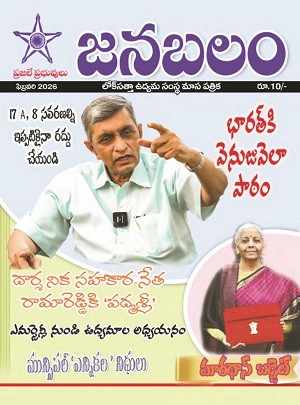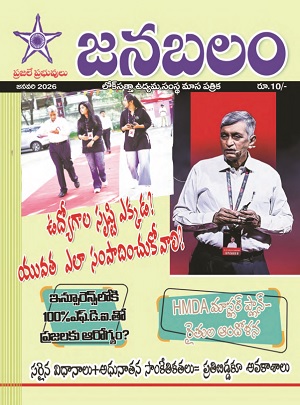He doesn't just share his name with a revolutionary; he too is leading a revolution, a revolution to bring good governance and social change through clean politics and to change the way politics is conducted in this country.
DR. JAYAPRAKASH NARAYAN or JP as he is popularly known is a physician turned IAS officer, who quit the service and founded Loksatta (people's movement) in 1996. 15 years later he is the national president of the Loksatta party and the party's first sitting MLA from Kukatpally in Andhra Pradesh. Now the flag bearer of citizen driven clean politics in the country JP, 56, is widely acknowledged to have ushered in a new kind of politics with good governance and citizen participation as its pivot. At a time when Mumbai is facing a mega crisis of development and infrastructure, the upcoming BMC polls are touted to be most crucial for Mumbai's future.
JP's Loksatta, with citizen initiated politics at its forefront, too has decided to jump into the poll fray. In Mumbai to launch Loksatta's poll campaign JP speaks his mind on the need for change in politics, the need to have an organised political party and tell us how empowered citizens can usher in change. In search for yet another revolution, nothing drives change like politics does, JP says.
Excerpts:
Q. Loksatta's thrust has always been citizen's driven clean politics for better governance? What does it mean in real terms and how do you look at it electorally?
A. Loksatta was initially a civil society initiative bit it has come a long way from then. We are a fully functional political party with presence in almost four states today. Educated, middle class candidates have enthusiastically come forward to fight the elections under the Loksatta banner. 21st century India cannot be run with 19th century politics and governance. The best and brightest must be attracted and provided a platform for making genuine change happen. A basket of administrative, political, electoral and judicial reforms are required over the next few years to drive India towards achieving its potential for that we need constructive political engagement with various stakeholders, which cannot happen without electoral politics. It might sound clichéd but at the end of the day, politics is all about numbers and I feel nothing can drive change like politics does.
Q. At the BMC polls here in Mumbai there are several other citizen groups that have joined the poll fray. What makes Loksatta different and why do you think it is a ' political party' rather than citizen groups present a better alternative? A. It is a heartening to know that citizen groups have come forward and we welcome them. But in politics individual efforts don't last. The existing political set up is too powerful and only a political party with a collective identity can capture the imagination of the people.
A. Party has a common goal, ideology and discipline, there is a constitution and a party is bound by anti- defection laws, so no member can take the other for a ride.
We need a party to generate funds too, and let me be frank; there can be no politics without money.
What we need is clean politics with money that is accountable for. Electoral politics only brings about a change of players, not a change in the rules of the game. Without an effective alternative, there won't be any change and only a political party can be that credible alternative.
Q. But there is widespread political apathy in India especially in cities and amongst the youth, how do you think that can change?
A. Young people have abdicated politics and the country is paying a heavy price for that. Politics is not for private gain but it is a noble profession with a noble cause. It should be treated like one. I always say the answer to bad politics is not no to politics but good politics. India is in trouble because of bad politics, not because of politics in itself. Unless people participate in politics there can't be any change. A romantic idea of citizenship is necessary but not sufficient, unless there is active political work the scenario will not change.
Q. But all these citizen groups including Loksatta are city based with little or no impact in rural areas which control a large chunk of electoral seats? Don't you think the entire citizen buzz is elitist and urbanised?
A. Initially, all such activity is urban but I believe in rural areas it will catch up even faster. Our capacity is limited; it's our weaknesses that we aren't able to reach out to them ( rural masses) and not their weaknesses. Rural change can in fact be faster than urban change. There is no difference between urban and rural areas as far as the need or quest for clean politics is concerned. Rural areas play a much more important role in politics than urban areas and it is they who need good governance and development more than the rich and middle classes. Reform can be done much more easily by the urban middle class, which is natural since they have access to all means of reform but eventually reforms will penetrate into rural society and that will bring real change.
Q. You are into politics and activism for almost two decades now. Where are we heading and what change do you see in the days to come, in politics and people's approach to politics?
A. Today, there is need to promote ethical political parties. One cannot afford to shy away from politics, which will be the worst scenario.
It requires a lot of hard work to build consensus and gain people's confidence.
People who are running away from politics should realise the importance of politics. It is a long drawn process and can't be a one shot attempt. Traditional parties too should realise that with access to information and media, people are not going to except status quo, they will start asking questions and will not take things lying down. The sooner they realise, the better for them and for the system too that the current scheme of politics is unsustainable. The time has come for clean politics. Loksatta has shown the power of one. If there is will and effort change can happen.
Courtesy: Free Press Journal
Tuesday, October 18, 2011
Nothing Drives Change Like Politics Does
Labels:
english
Subscribe to:
Post Comments (Atom)





No comments:
Post a Comment